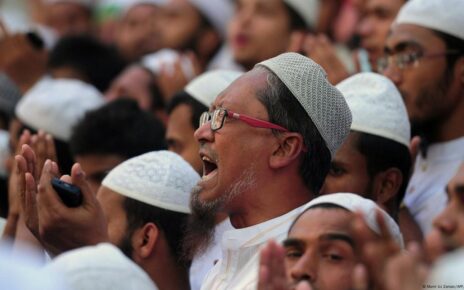Mohammad Al Mamur, United Kingdom
- Collapse of Hasina’s Regime and the Vacuum Created
In August 2024, mass student-led protests forced Prime Minister Sheikh Hasina into exile, dissolving the Awami League’s long-standing grip economictimes.indiatimes.com+12en.wikipedia.org+12facebook.com+12wsj.com+1en.wikipedia.org+1. This created a political vacuum swiftly filled by an interim government headed by Nobel laureate Muhammad Yunus. - Interim Government and Legal Reforms
The Yunus-led interim government repealed bans on Jamaat‑e‑Islami and its student wing, Islami Chhatra Shibir, which had been proscribed earlier in the year apnews.comen.wikipedia.org+2en.wikipedia.org+2en.wikipedia.org+2. In June 2025, the Supreme Court reinstated Jamaat’s registration, formally legalizing a party previously tied to wartime atrocities facebook.com+4en.wikipedia.org+4albd.org+4.
Jamaat-e-Islami’s Return from the Shadows
- From Outlawed to Legal
Jamaat’s reversal—from ban in August 2024 to revival by early June 2025—marked an abrupt policy reversal, enabling an extremist party with a history of 1971 genocide links to re-enter political life albd.org. - Student Wing’s Resurgence
Islami Chhatra Shibir, Jamaat’s militant student arm implicated in violent campus incidents, also saw its ban lifted by August’s interim government, raising alarms about renewed influence in universities timesofindia.indiatimes.com+11en.wikipedia.org+11en.wikipedia.org+11.
Hefazat-e-Islam: From Madrasa Movement to Political Player
- Assertive Islamist Advocacy
Hefazat‑e‑Islam, a Deobandi group founded in 2010, used its influence post-regime-change to challenge progressive laws, including a proposed Women’s Affairs Reform Commission—revealing its growing political assertiveness en.wikipedia.org. - Ideological Positioning
While professing moderate aims recently, Hefazat remains deeply conservative, opposing democratic reforms and pushing for stricter Islamic social norms en.wikipedia.org.
Communal Violence and Attacks on Minorities
- Violence Surge in Late 2024
After Hasina’s fall, communal violence surged: at least 2,010 attacks on Hindus between August 4–20 included arson, looting, and the destruction of temples—killing at least 5 en.wikipedia.org+3en.wikipedia.org+3apnews.com+3. - Continued Attacks and State Response
By end-2024, the Hindu–Buddhist–Christian Unity Council documented 174 further incidents, claiming 23 minority deaths and 9 rapes youtube.com+15apnews.com+15timesofindia.indiatimes.com+15. Although the interim government denied communal motives, the violence often involved Islamist-linked actors youtube.com+13apnews.com+13en.wikipedia.org+13.
Press Freedom and Islamist Media Influence
- Media Crackdown with Islamist Overtones
The interim government instituted a sweeping campaign against the press: over 350 journalists harassed, more than 110 criminal cases, accreditation revoked for 167 media professionals. Islamist-aligned groups reportedly filled media leadership roles, weakening secular voices en.wikipedia.orgen.wikipedia.org. - Islamist Ideological Media Control
Reports cite Jamaat‑e‑Islami’s increasing sway over media institutions, pushing agendas aligned with religious conservatism at the expense of independent journalism en.wikipedia.org+6en.wikipedia.org+6en.wikipedia.org+6.
- Jamaat-BNP Alliance
Jamaat formed a pragmatic alliance with the Bangladesh Nationalist Party (BNP) during the transitional elections, positioning themselves as kingmakers by facilitating the opposition’s claim to power . - Long-Term Political Strategy
Legal revival and electoral alliances are key to the Islamist agenda: gaining legitimacy through democratized structures ensures lasting political influence beyond the interim period en.wikipedia.org+2en.wikipedia.org+2rightsrisks.org+2.
Social Repression and Legal Tools
- Targeting Civil Society
Extremist groups and Islamist sympathizers allegedly played roles in suppressing protests, including harassment of minorities, journalists, secular student activists, and press voices through both street-level violence and legal crackdowns . - Legal Instruments of Control
Arrests, criminal charges, freezing of assets, and revoked credentials under the guise of national security disproportionately impact critics of Islamist resurgence .
- Threats to Democracy
The re-empowerment of Islamist parties signals a shift toward religious conservatism, jeopardizing Bangladesh’s secular constitution and minority rights once championed by the Awami League youtube.com+12usanasfoundation.com+12economictimes.indiatimes.com+12albd.org+1economictimes.indiatimes.com+1. - Civil Resistance and International Scrutiny
Minority and secular groups, NGOs, and human rights bodies have condemned the trend, with appeals to institutions like the UN and calls for protection of fundamental rights en.wikipedia.org.
Conclusion: A Troubling Shift
- A Paradigm Shift in Power Structures
The interim regime’s reversal of secular protections, rehabilitating Islamist groups, and recasting political alliances marks a dangerous tilt. The fusion of religious fundamentalism with state power is reshaping the national order. - Need for Vigilant Response
Ongoing communal violence, suppression of dissent, and increasing Islamist influence demand domestic and international vigilance. The democratic promise of the 2024 movement risks being undercut unless civil society, political stakeholders, and global actors advocate for transparency, legal equity, and inclusion.
